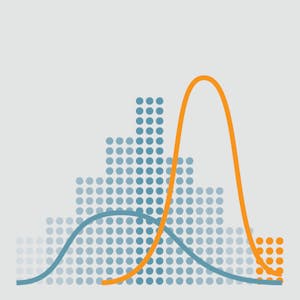Bayesian Statistics
This course describes Bayesian statistics, in which one’s inferences about parameters or hypotheses are updated as evidence accumulates. You will learn to use Bayes’ rule to transform prior probabilities into posterior probabilities, and be introduced to the underlying theory and perspective of the Bayesian paradigm. The course will apply Bayesian methods to several practical problems, to show end-to-end Bayesian analyses that move from framing the question to building models to eliciting prior probabilities to implementing in R (free statistical software) the final posterior distribution. Additionally, the course will introduce credible regions, Bayesian comparisons of means and proportions, Bayesian regression and inference using multiple models, and discussion of Bayesian prediction.We assume learners in this course have background knowledge equivalent to what is covered in the earlier three courses in this specialization: “Introduction to Probability and Data,” “Inferential Statistics,” and “Linear Regression and Modeling.”
None
Syllabus
Syllabus - What you will learn from this course
Week 1
About the Specialization and the Course
The Basics of Bayesian Statistics
Week 2
Bayesian Inference
Week 3
Decision Making
Week 4
Bayesian Regression
Week 5
Perspectives on Bayesian Applications
Data Analysis Project
FAQ
When will I have access to the lectures and assignments?
Access to lectures and assignments depends on your type of enrollment. If you take a course in audit mode, you will be able to see most course materials for free. To access graded assignments and to earn a Certificate, you will need to purchase the Certificate experience, during or after your audit. If you don't see the audit option:
The course may not offer an audit option. You can try a Free Trial instead, or apply for Financial Aid.
The course may offer 'Full Course, No Certificate' instead. This option lets you see all course materials, submit required assessments, and get a final grade. This also means that you will not be able to purchase a Certificate experience.
What will I get if I subscribe to this Specialization?
When you enroll in the course, you get access to all of the courses in the Specialization, and you earn a certificate when you complete the work. Your electronic Certificate will be added to your Accomplishments page - from there, you can print your Certificate or add it to your LinkedIn profile. If you only want to read and view the course content, you can audit the course for free.
Is financial aid available?
Yes. In select learning programs, you can apply for financial aid or a scholarship if you can’t afford the enrollment fee. If fin aid or scholarship is available for your learning program selection, you’ll find a link to apply on the description page.
What background knowledge is necessary?
We assume you have knowledge equivalent to the prior courses in this specialization.
Will I receive a transcript from Duke University for completing this course?
No. Completion of a Coursera course does not earn you academic credit from Duke; therefore, Duke is not able to provide you with a university transcript. However, your electronic Certificate will be added to your Accomplishments page - from there, you can print your Certificate or add it to your LinkedIn profile.
Reviews
Great course. Quite difficult though. I wished it was split to two course or maybe an entire specialization dedicated for this.
I wanted to tools for Bayesian Statistics to be as functional as the other tools available. No problem with the class. I think the material will get there for R.
This is the hardest courses I have taken. I hoped to have more supplemental reading materials and more practical exercises in R.
I find the teaching a bit unclear. I still don't sure I understand how to use Bayesianinference on problems I encounter in my work.
